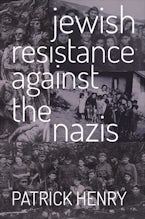Preparing your PDF for download...
There was a problem with your download, please contact the server administrator.
Jewish Resistance Against the Nazis
Imprint: Catholic University of America Press
This volume puts to rest the myth that the Jews went passively to the slaughter like sheep. Indeed Jews resisted in every Nazi-occupied country—in the forests, the ghettos, and the concentration camps. The essays presented here consider Jewish resistance to be resistance by Jewish persons in specifically Jewish groups, or by Jewish persons working within non-Jewish organizations. Resistance could be armed revolt; flight; the rescue of targeted individuals by concealment in non- Jewish homes, farms, and institutions; or by the smuggling of Jews into countries where Jews were not objects of Nazi persecution. Other forms of resistance include every act that Jewish people carried out to fight against the dehumanizing agenda of the Nazis—acts such as smuggling food, clothing, and medicine into the ghettos, putting on plays, reading poetry, organizing orchestras and art exhibits, forming schools, leaving diaries, and praying. These attempts to remain physically, intellectually, culturally, morally, and theologically alive constituted resistance to Nazi oppression, which was designed to demolish individuals, destroy their soul, and obliterate their desire to live. The contributors are among the most renowned Holocaust authorities in Israel, Europe, Canada, and the United States. The essays treat Jewish resistance in France, Belgium, Italy, Greece, the Netherlands, Scandinavia, the Yishuv, Germany, Austria, Croatia, Poland, Romania, the Ukraine, Belarus, Slovakia, and Hungary. Some essays describe children's resistance and music as resistance. The authors explain why different types of resistance occurred in some places but not in others and how factors such as terrain played a vital role in why one type of resistance took place in some areas but was impossible elsewhere. The importance of chronology and the progress of the war are also considered. This comprehensive handbook will serve as an indispensable guide for Holocaust scholars and general readers.
PATRICK HENRY is the Cushing Eells Professor Emeritus of Philosophy, Literature and Foreign Languages at Whitman College
"The definitive treatment of this subject."
~R.S. Levy, CHOICE
"Recommended"
~Murray Polner, History News Network – George Mason University
"This long-awaited, stirring, and detailed collection of essays sets out to remedy all prior misconceptions. The book explores the myths of passivity, the old questions, such as, 'Why didn't they resist more?' and the omissions and distortions of facts of Jewish Resistance... In assembling this most impressive collection of essays, editor Patrick Henry has produced the most complete of Jewish resistance anywhere. Whether for student, scholar, or general reader, this tome is imperative in any Holocaust library."
~Rachelle Goldstein - Editor, The Hidden Child
"The contributors… writing and scholarship are uniformly cogent and excellent, a tribute to the editorial skills of Patrick Henry… an indispensable resource for Holocaust scholars as well as the general public."
~Michael N. Dobkowski, Jewish Book Council
"Patrick Henry's edited volume on Jewish resisitance against the Nazis is a rich and powerful contribution to Holocaust scholarship… this impressive collection of essays by promnient researchers provides detailed examinations of a wide array of Jewish resistance activities... The volume is admirable in its breadth... To repeat Patrick Henry's words, the perpetuaiton of the idea that Jews did not resist against the Nazis is 'simply unconscionable.' In that sense, it is unfortunate that this volume needed to be written. Nonetheless, I am glad that it was, and I recommend it highly. It is a reference to which I will turn again and again."
~Rachel Einwohner, Holocaust and Genocide Studies
"Even before the end of the Second World War the pernicious notion that Jewish victims had gone like 'sheep to the sluaghter' was widespread. To the shame of us all, it persists today as a shadowy aspect of the public's misunderstanding of the response of European Jewry to the Nazi onslaught. Accordingly, this edited collection of twenty-three original essays is a major corrective, one that belongs on every relevant public and private bookshelf. No one who considers himself or herself knowledageble about the Holocaust can afford to miss reading this myth-shattering material, and it merits a place of honor in every school curriculum and memorialization project dedicated to telling the truth about the attitudes, behavior, culture, and values of European Jewry from 1933 through 1945... Strong in scope, depth, and compassion, this outstanding volume can help society move beyond 'blaming the victim' stereotypes, and add to its memory of the Holocaust the overdue appreciation for the stealth altruism of Jewish victims whose non-violent resistance took the form of secretly trying to help and care for one another."
~Arthur B. Shostak, Drexel University, The European Legacy


